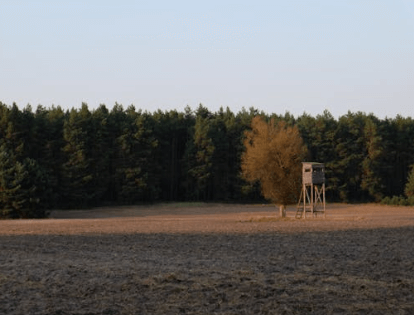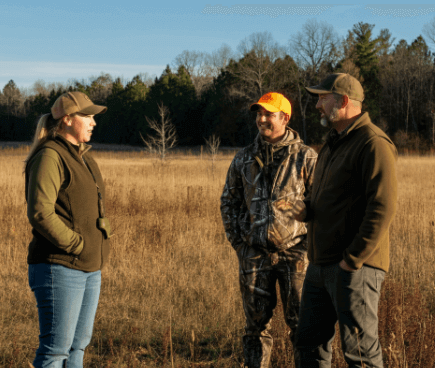Did you know that over 11.5 million Americans actively hunt each year, yet only 2% own their hunting property? This growing demand has driven up hunting land prices by 15% annually in prime locations, making smart purchasing decisions more crucial than ever. Buying hunting land is one of the most rewarding investments you can make, offering not just recreational opportunities but also long-term financial returns through timber sales, leasing rights, and property appreciation. However, the process of buying hunting land requires careful planning, from understanding local wildlife patterns and water sources to navigating zoning laws and financing options. Many first-time buyers make costly mistakes that could have been easily avoided with proper guidance and expertise. Steve Daria and Joleigh, renowned real estate investors and land buyers for cash, have helped countless hunters secure their dream properties through strategic buying approaches for hunting land that maximize both recreational value and investment potential. Whether you’re looking for whitetail territory in the Midwest or waterfowl habitat in the South, understanding the complete process from initial scouting to final closing will save you thousands and ensure you get the perfect hunting sanctuary. Ready to turn your hunting dreams into reality? Book a free discussion with Steve Daria and Joleigh today and discover how their proven strategies can help you find and secure the perfect hunting property at the right price!
Key Points
- Scout the Land for Wildlife Activity and Habitat Quality: Look for natural food sources, such as oak trees, agricultural fields, and water access, that attract your target game species throughout the year. Check for fresh tracks, droppings, rubs, and scrapes during different seasons to confirm consistent wildlife activity on the property.
- Research Water Rights and Access Laws: When buying hunting land, verify that the property includes legal water access rights, as many states have complex laws governing the use of streams and lakes. Confirm whether you’ll have year-round access to water sources and understand any restrictions that might affect your hunting activities.
- Understand Local Zoning and Hunting Regulations: Check zoning laws and restrictions for hunting and building blinds or stands. Research state hunting regulations, seasons, and bag limits specific to your area to avoid any legal complications after purchase.
- Evaluate Access Routes and Neighboring Properties: Ensure you have legal access to your hunting land through established roads or easements, as landlocked properties can create significant problems. Investigate neighboring land uses to confirm they won’t interfere with your hunting activities or wildlife movement patterns.
- Work with Experienced Land Professionals for Closing: When buying hunting land, collaborate with real estate agents who specialize in recreational properties and possess expertise in the unique intricacies of hunting land transactions. Have the property professionally surveyed and conduct a thorough title search to avoid boundary disputes or ownership issues after closing.
What makes good hunting land?
Good hunting land has several key features that attract wildlife and provide successful hunting opportunities year after year.
The most important element is a reliable water source, such as streams, ponds, or springs, since all animals need water daily and will travel regular routes to reach it.
Quality hunting properties also offer diverse habitats with a mix of open areas for feeding and thick cover for shelter, creating the perfect environment for deer, turkey, and other game species.

Food sources are equally critical, including natural options like oak trees that produce acorns, native plants, and nearby agricultural fields that provide consistent nutrition throughout different seasons.
The land should have minimal hunting pressure from neighboring properties, allowing wildlife to feel secure and establish predictable movement patterns.
Proper access routes that don’t disturb the animals are essential, along with good drainage to prevent the property from becoming too wet or muddy during hunting season.
When buying hunting land, look for properties with varied terrain that includes ridges, valleys, and transition zones where different habitat types meet, as these areas typically see the most animal activity.
Finally, consider the property’s potential for improvement through the establishment of food plots, trail maintenance, and habitat management to enhance its long-term value as a prime hunting ground.
Get Started: Get Your Cash Offer Below…
We are direct land buyers. There are no commissions or fees and no obligation whatsoever. Start below by sharing where your property is and where we can send your offer…
How much does hunting land typically cost?
Hunting land prices vary greatly across the United States, with costs typically ranging from $1,000 to $10,000 per acre depending on location, quality, and available game.
Prime hunting properties in the Midwest with excellent deer populations can cost $3,000 to $6,000 per acre, while similar land in the South may range from $2,000 to $4,000 per acre.
Remote properties in less populated areas often sell for $1,000 to $2,500 per acre, making them more affordable for first-time buyers.
Factors that drive up prices include proximity to major cities, water access, timber value, and the presence of trophy game species.
When buying hunting land, expect to pay premium prices for properties with established food plots, hunting blinds, and well-maintained trails.
Land with additional income potential from timber harvests or agricultural leasing typically commands higher prices but can offset ownership costs over time.
Raw land without improvements generally costs less but may require significant investment to develop into quality hunting property.
Market conditions, local demand, and seasonal timing also influence prices, with properties often selling for 10-20% more during peak hunting seasons when buyer interest is at its highest.
How do I scout potential hunting land before making a purchase?
- Visit During Different Seasons and Weather Conditions: Plan multiple trips to the property throughout the year to see how wildlife patterns change with the seasons. Different weather conditions will also show you how the land handles rain, snow, and dry spells, which affect both animal movement and your access to hunting spots.
- Look for Fresh Animal Signs and Well-Used Trails: Walk the entire property, searching for fresh tracks, droppings, and rubs on trees, as well as worn game trails that indicate regular animal activity. When buying hunting land, these signs are your best indicators of which animals use the property and how often they visit different areas.
- Test Water Sources and Food Availability: Before buying hunting land, check all streams, ponds, springs, and other water sources to ensure they flow year-round and remain clean. Identify natural food sources, such as oak trees, fruit trees, and nearby crop fields, that will attract wildlife to the property season after season.
- Map Out Quiet Access Routes to Your Hunting Spots: Walk different paths to potential hunting locations to find routes that won’t disturb the animals you want to hunt. Smart access planning is crucial when buying hunting land because noisy or poorly placed routes can ruin even the best hunting property by constantly spooking wildlife.
- Talk to Local Hunters and Neighboring Landowners: Introduce yourself to nearby property owners and ask about the wildlife they see, hunting pressure in the area, and any problems with the land. Local knowledge from farmers, hunters, and long-time residents can reveal important details about the property that you might miss during your scouting trips.

What legal issues should I research when buying hunting land?
When buying hunting land, you must research several critical legal issues to avoid costly problems later.
First, verify property boundaries through a professional survey to prevent disputes with neighbors and ensure you’re getting the exact acreage advertised.
Check water rights carefully, as many states have complex laws about stream and lake access that could affect your hunting activities.
Research any existing easements that allow others to cross your property or limit your use of certain areas.
Investigate mineral rights to understand if you own subsurface resources or if mining companies have claims that could disrupt your hunting.
Review local zoning laws and hunting regulations to confirm the land can be used for your intended purposes and understand any restrictions on building blinds or food plots.
Examine the property’s title history for liens, unpaid taxes, or other encumbrances that could become your responsibility.
Finally, check if there are any homeowners’ associations, conservation easements, or deed restrictions that might limit hunting activities or property improvements you want to make.
How do I finance hunting land purchases?
- Cash Payment: Paying cash gives you the strongest negotiating position and fastest closing time. Many sellers prefer cash buyers and may accept lower offers for the certainty and speed of a cash transaction.
- Land Loans from Banks: Traditional land loans typically require a 25-50% down payment, accompanied by higher interest rates compared to home mortgages. These specialized loans are specifically designed for raw land purchases and offer terms of 10-20 years.
- Owner Financing: Many landowners offer direct financing of the sale, often with more flexible terms than banks. When buying hunting land through owner financing, you can negotiate lower down payments and avoid lengthy bank approval processes.
- Home Equity Loans: If you own a home, borrowing against your equity offers lower interest rates than land loans. This option provides cash for stronger negotiating power and quicker closings.
- USDA Rural Development Loans: Government-backed USDA loans offer reduced down payments and competitive rates for qualified rural properties. These programs specifically support the purchase of recreational land in eligible areas.
What happens during the closing process for hunting land?
The closing process for hunting land involves several important steps to finalize your purchase and transfer ownership.
First, a title company or attorney verifies that the property’s title is clear and free of liens or legal issues.
During this time, you’ll complete a final property inspection to verify the land’s condition matches your expectations from earlier visits.
When buying hunting land, your lender will order a professional appraisal to make sure the property’s value meets their loan requirements.
Next, you’ll review and sign all closing documents, including the deed, loan papers, and any easement agreements.
The closing agent handles fund transfers, while you cover closing costs, such as attorney fees, title insurance, and recording fees.
Finally, the deed will be recorded at the county courthouse, officially making you the new owner.
You’ll receive keys to any gates, copies of all documents, and can begin enjoying your new hunting property.
Ready to close on your dream hunting property? Contact experienced land professionals today who can guide you through every step of the closing process and ensure a smooth transaction!
**NOTICE: Please note that the content presented in this post is intended solely for informational and educational purposes. It should not be construed as legal or financial advice or relied upon as a replacement for consultation with a qualified attorney or CPA. For specific guidance on legal or financial matters, readers are encouraged to seek professional assistance from an attorney, CPA, or other appropriate professional regarding the subject matter.
